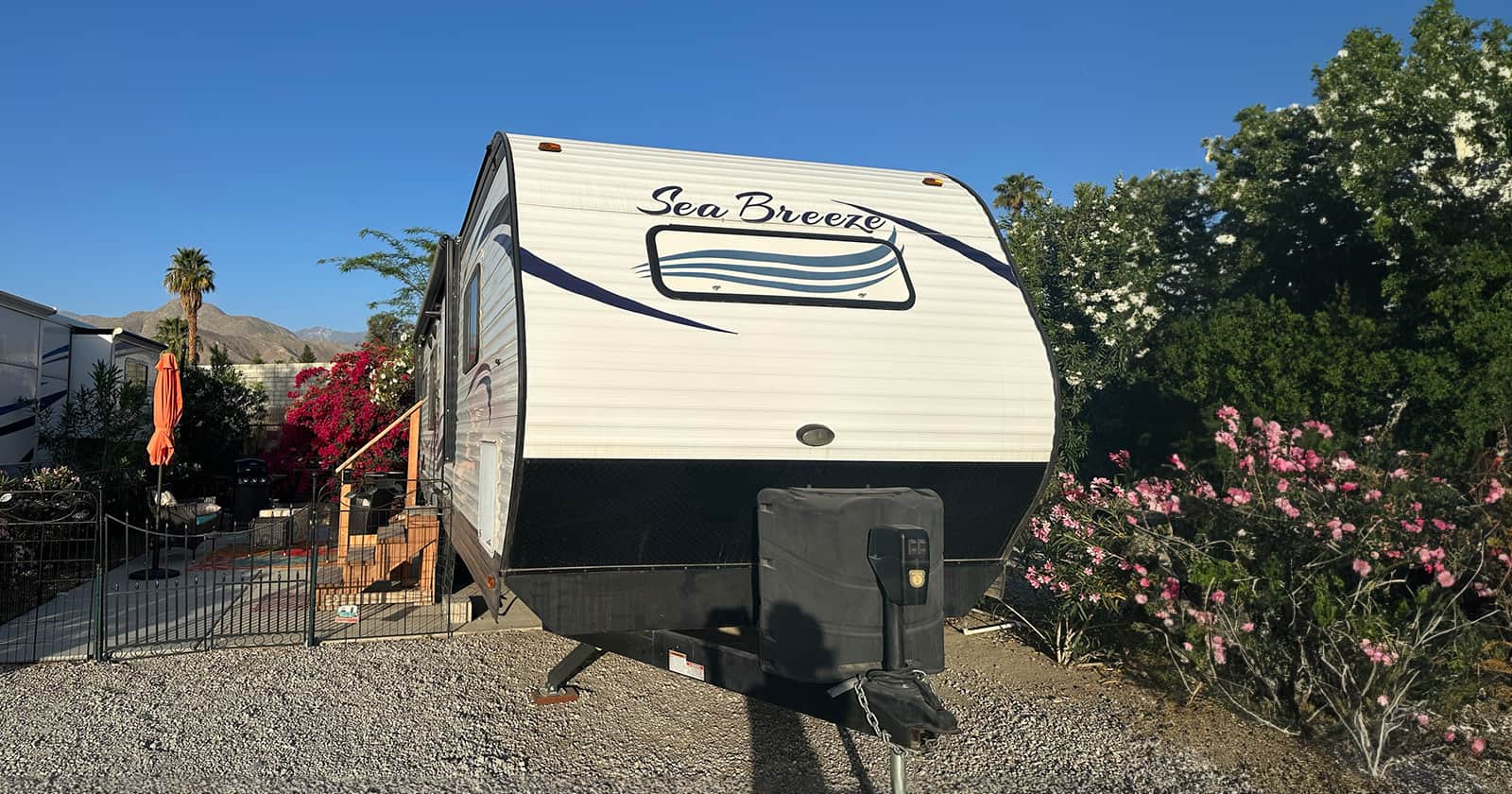As with any dream, people may delay or completely give up on pursuing full-time RVing because of fear and doubt. Standing in their way are uncertainties of all kinds. Will RVing break the bank? Is this the right choice for my family? The list of questions goes on. What’s missing in this cloud of apprehension is clarity. There are many RV myths circulating that are simply untrue.
For anyone still on the fence about the nomad lifestyle, now is as good a time as any to get to the bottom of the matter and start your quest to learn the absolute truth behind the misconceptions. Once you know the facts, you can take steps of your own to better prepare for your new life on the road. The following are three full-time RV myths busted!
Myth #1: RVing is Expensive
In short, it all comes down to you. RVing can be as over-the-top expensive or frugal as you make it.
- Upfront costs can be expensive depending on the type of rig you choose. But if you are looking for a more affordable unit, opting for an older, used model greatly reduces the up-front cost.
- Fuel can get costly traveling from one destination to the next, but longer stays at each location mean fewer trips to the fuel station.
- Strictly opting for campgrounds and RV parks or resorts can get pricey quickly, but throwing boondocking and discount camping memberships in the mix will lessen the monetary load.
Make Full-Time RVing Work Financially For You
Establish a monthly budget upfront. Regular costs for full-time RVing include fuel, camping fees, food, phone/internet, insurance, RV/extra vehicle maintenance and repairs, and adventuring. Of course, additional items could include any outstanding debts or loans, medical bills, and other miscellaneous costs like pet expenses, trips to the laundromat, etc.
List your potential expenses. While you may not know the exact amount for every item, fill in what you do know in the way of typical monthly charges. Generally speaking, all items on the list can be reduced to manageable numbers by finding ways to save, like in the tips below:
To minimize your monthly budget costs:
- Pay off outstanding debts before beginning your full-time RV adventures.
- Opt for club memberships that offer discounts on campground/RV resort stays.
- Camp for free/boondock throughout the year.
- Cook at home as opposed to eating out.
- Perform regular maintenance on your RV to avoid unnecessary repairs down the road.
- If you haven’t already, create an emergency fund for those unexpected repairs or services that will inevitably happen along your journey.
Myth #2: RV Life is a Constant Vacation
RVing is an adventure like no other! Traveling the countryside, visiting famous sites, exploring new places, meeting folks from all over, sampling delicious cuisine from different regions, and seeing the sun rise and set on some of the most gorgeous landscapes sounds like a constant vacation! Reality check: Like everything in life, full-time RVing has its highs and lows.
Not to put a smudge on those rose-colored glasses, but RVing has its fair share of mishaps and unfortunate events. There’s a learning curve to full-time RVing, and it’s important to realize, heading into this lifestyle, that things won’t go your way all the time.
- Things in your RV will eventually break.
- You may get a flat tire.
- Your next camping spot won’t be that picturesque setting you imagined.
- Cell service will be spotty at some locations.
- You may not particularly enjoy your neighbors at an RV park.
- Let’s not forget emptying the black tank. Sewer debacles are also part of the fun.
But these incidents ought to be seen as part of the adventure. The good with the not so wonderful go hand-in-hand to make the journey! Learn from the mistakes and become proactive to prevent future mishaps.
Myth #3: RV Travel is Only For Retired Folks
“Traveling the country at a leisurely pace has historically been seen as a reward for having lived a productive life. Now, however, there is an ever-increasing number of full-timing folks who do not match that particular demographic, and whose motivations are somewhat different.”
“Full-time RVing has really taken off in the last few years. Traditionally, the full-time RV life has belonged almost exclusively to retirees, “ mentions a Do It Yourself RV article.
Move over baby boomers, here come Gen Xers and Millennials. The idea of “wanderlust” is a huge draw for the younger generations; full-time RVing is trending. Millennials, in particular, have shown a great interest in nomadic life, leading the pack in RV purchases throughout the past few years.
A 2018 report by RV LIFE explained, “Manufacturers are expecting to ship nearly half a million RVs in 2018. Even more encouraging though, is the age of the buyers. Younger enthusiasts looking for a cheap, versatile vacation are largely driving sales growth.”
A 2020 Camper Report article mentioned how an uptick in Class B sales was due to millennials. “…among the many RVs to choose from, the Class B motorhome seems to be the pick of the litter for millennials. Besides being compact and easy to drive, camper vans are becoming the new homes-on-wheels for digital nomads.”
Even before the pandemic, younger generations saw the advantages of living life on the open road. For many, this new way of living is…
- An escape from the monotony of typical life, working 9-5 until retirement
- A way to live minimally
- A more affordable lifestyle
- A perfect option for digital nomads and other traveling workers
Even More RV Myths Busted
For an even broader reality check on full-time RVing, check out this video from full-time veterans Chris Dunphy & Cherie Ve Ard of Technomadia. The vlog was recorded almost 10 years ago, but the myths and realities they discuss still ring true for RVers today.
Bust RV Myths By Being Proactive and Using Helpful Resources
Rather than relying on RV myths and other hearsay, get the facts and learn about how you can make full-time RVing work for you! Resources like the trip planning program RV LIFE Trip Wizard and the accompanying RV LIFE Safe GPS app are invaluable for travelers. This nifty online tool helps RVers find and map out RV-friendly routes to camping destinations like boondocking spots and RV campgrounds all over the nation.
Are you a full-time RVer? What RV myths have you heard about on the road? Please share them in the comments below.





We lived on the road for nine years. Started in travel trailer, then two fifth wheels. Both of us had jobs that could take us pretty much wherever we wanted to go. Had to “go back home” after the crash in 2008, as my husband’s jobs became very scarce. Planning on returning to the road when he retires next year. We loved being on the road, new places, new friends and amazing food. Biggest thing is learning to live in a small space and pairing down your belongings. Enjoy the journey!
Okay, you gave some tips for how to keep down costs, for the #1 myth. A comparison between conventional house-living expenses (and working a job, which is harder for most on the road if not impossible–you obviously did not mean retired full timers), would have been more convincing. Sure, it is up to the individual in both cases how much they spend on luxuries, but the basic necessary expenses, that’s the thing to compare. And gas is now a huge expenditure. #2–it certainly won’t be all vacation, since most people would have to do some kind of work, if only camp hosting, at some point (unless they are set up for life). For both of these you’ve got to have some skills. Of course, many Millennials have computer skills and some are incredible–thus can work anywhere. For the rest of us it is a little more complex–and more uncertain–than you make out. Especially if going full time means giving up a home that’s paid for. If you have nothing to lose…well, give it a try if you don’t have to invest a lot in it.
Myth #2: Even more eye-opening than the downsides listed are all the activities that you do before or after a 2-week vacation, but can’t put off when you fulltime.
Plan extra time for everyday things like grocery-shopping, laundry, cleaning, routine maintenance, dealing with bills, travel research and reservations. Then there are routine activities you take for granted at home, but are much more challenging on the road. For example, when it’s time for your semi-annual teeth cleaning you’re used to making a 5-minute call to your regular dentist. Done! On the road you need to figure out where you’re going to be in a few weeks, who there is in your network, which practices have good reviews, then call several offices before you find one willing to just give you a cleaning and not insist on a 2-visit new-patient work-up including X-rays (not covered by insurance because you just had them taken 6 months ago).
Particular about who cuts or colors your hair? Get over it.
And it’s not just breakdowns per se…there’s also finding a reputable mechanic/contractor, how long it takes to get on their schedule (sometimes weeks or months), if your rig is habitable/your truck drivable in the meantime, how long it will be in the shop, if you have to move into a hotel, and the domino effect all that has on the camping reservations that — these days — often need to be made months in advance and (with increasing frequency) are non-refundable.
All that said, it’s still an amazing way to live and travel. Even better if you do your homework, go in with your eyes open, remain flexible, and are not easily ruffled when (not if) the unexpected occurs.
I have to disagree with RVing not being expensive. With gasoline and diesel at record prices – double – that’s the most noticeable problem. We get 6.5 miles/gallon. Traveling at 65 MPH, we’re burning 10 gallons/hour. The cost of driving our RV for fuel alone is therefore 10 times the price of one gallon of fuel/hour. With a new RV, you have, at least, a warranty. Although you can buy extended warranties, they’re expensive. An oil change can easily exceed $300. Tires cost $600 each and they only last 6 years no matter how good they look. Sure, a used unit will cost less, but repairs are very costly unless you do the repairs yourself. If you ever break down and need a tow, you risk drive train damage and windshield breakage. The cost of insurance is significant, yet you can’t count on that insurance to cover the damages caused by incompetent repair work. Make sure you tow a car in case you get stranded. Every time we take a trip, the “great unknown” is what will break. Campgrounds are getting to be almost as expensive as hotels. Before the fuel price hikes, you had to make reservations, sometimes years in advance. Planning on buying an RV? Just where are going to park it? No, your HOA will not let you park it in your back yard! Look – if you don’t know how you’ll pay for your kids’ college and haven’t significantly funded your retirement, then if you still want to go camping, buy a tent. Don’t let anyone kid you. RVing requires some more-than-basic mechanical skills and lots of money.
Where do full time RVers get there mail?
Glass is half empty people on here. All their downside comments also hold true for living in a sticks and bricks with rampant inflation and horrible gas prices for your daily commute to work. Also, staying a month in an RV park is enormously cheaper than overnight rates, especially if you don’t insist on a “resort” atmosphere. At least here in the Southwest if you look you can still find clean, basic parks in the $400.00ish a month range. Stay a little ways outside of the real popular areas. Do your own basic maintenance such as oil changes. Compare “expensive” RV life to the reality of rent or mortgage payments these days plus insurance and taxes, etc., etc. It can still look pretty good if you don’t need a 45′ diesel pusher parked in a RV resort with pool and spa.
We full-timed for about 3 years. We’re both retired, which made things easier. We were on a budget (due to aforesaid retirement), which didn’t! This is our takeaway;
1. Have a toad (aka towed vehicle). This was our top priority. A quick trip to the grocery store or laundromat is no longer a quick trip if you have to break camp first, and if anything happens to the motorhome, the toad is your lifeline to get help if you’re out of cellphone range, or get to a hotel if you can’t stay overnight in your rig. Also, it’s invaluable if you’re camped in a central location & want to make side trips to local attractions.
2. Get Coachnet, or some other reliable breakdown service, and do your research first! We originally had breakdown service through the SAMaritan with the halo over his head (you know who I mean!). Had to use them twice, and both times took forever to get someone out, had to call back two or three times for progress updates, and one time the mechanic said he’d never worked on our type of engine! Coachnet, on the other hand, kept me updated with the mobile mechanic’s ETA, then called back once he was done to make sure we were back on the road.
3. IMO, extended warranties are a waste of money, once you read the small print & discover the myriad of things not covered. Instead, I kept $5,000 as an emergency fund, $1,000 in cash hidden in the bus. If you don’t need it, you still have the cash, whereas ESP premiums are gone forever.
4. Consider camp hosting. Some states require a 3 or 6 month commitment, others go month to month. I signed up with Missouri in 2018, had a choice of 4 State parks to host within a week. Whatever you go with, you have a free, usually full hook-up site. Light work is expected, depending on state & location, but there’s plenty of free time to explore & enjoy the neighborhood.
5. Make sure your rig has a generator, and take advantage of Walmart and Cracker Barrel parking lots for an overnight in transit stay. Cracker Barrel has dedicated RV parking slots at many locations. Check with Walmart first, some don’t allow it any more. But stay clear of truck stop parking; a lot of big rig drivers don’t like RV’s in “their area”, and will park really close, and many leave their engines running.
Jay well said. It is what it is and you better be ready for what comes. Like owning a boat. She’s a good girl but sometimes she’ll cost you a little more then you thought. Come to think about it just like a wife/ husband- but we’ll worth the experience. Best to acquire a good one and stick with it. 😊
Yep, loads of things not covered. I am converting a long wheelbase high top van into a camper. Loads less expensive than even buying a used RV in decent condition. And it is not something that needs a master craftsman to do it. Still undecided on what some parts will be from, but it will not be store bought. Chairs, etc., folding and made by me. Manual lift bed for extra space during the day and so I don’t have to make it if I don’t want. No propane period. DIY composting toilet. Hanging shower. Hand powered washing machine. Solar panels, wind turbine, battery charger from alternator, DIY generator. Tow a car? Not likely, more likely carry a small motor scooter with sidecar, maybe tow a boat or small work trailer. I will stay away from campgrounds when I can. Then the mail, along with doctor visits, prescription fills and renewals, and likely some I have forgotten. I have been researching all this for quite awhile now. I find all sorts of self proclaimed “experts” in “what you must to convert your van to a camper”, and seldom do two say the same thing, and most of it I would want nothing to do with the methods prescribed. But finding out how to actually exist on the road, zip. I could get a cot and a sleeping bag and go camping, but getting my mail, doctor visits, and all that, I pretty much have no clue at all.
We have traveled for over fifty years in motor homes , large trailers to our current small RV. We took our children all over the country when they were small , boon-docking most of the time , and today they both love to travel , hike and boon dock . We all live close to each other and our grown grandchildren as well . The constant travel and camping together made us a very close family .
Fuel costs! If you bare boned it on everything, including RV sites, todays fuel prices are a killer.
I was surprised to see the mail question come up. That seems like the easiest thing to me. For most things, especially bills, you can go paperless. If you maintain a home and have the associated bills, have them put on a card and the card will bill paperless. Then if you dont have a trusted person to forward the rest to, who can either forward the important things or send you a picture, there are services that will do just that, for a fee of course. If you are staying in one place a month or so you can open a PO box to have things forwarded–but that could put some delays on things.